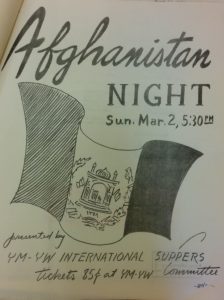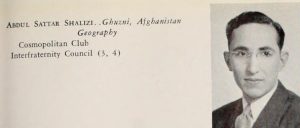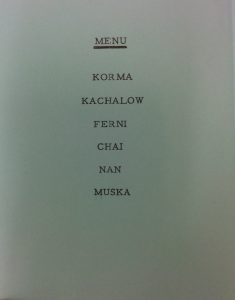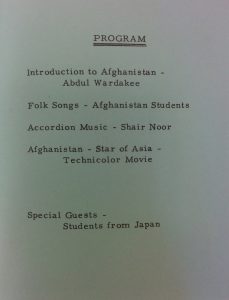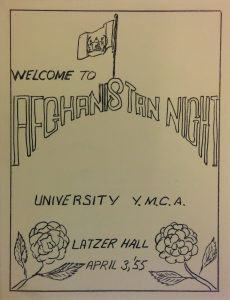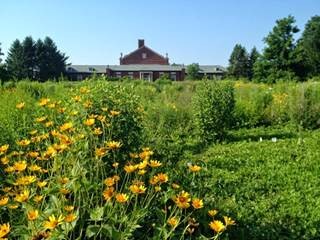Since at least 1939, Afghan students have been attending the University of Illinois. Early Afghan Illini have included chemical engineers, economists, educators, geographers, mechanical engineers, physicists, politicians, and student leaders too.
- A 1952 Afghanistan Night program promotional poster, found in Record Series 41/69/322.
Read on to learn about more early Afghan Illini!
Early Illinois – Afghanistan Connections
As early as the 1950s, a variety of University community members were already connected with the people of Afghanistan. In 1954, for example, English as an International Language Professor Mary Adeline Hussey (Record Series 41/20/141) visited Afghanistan. Then two years later, in 1956, Library Science Professor and University High School Librarian Alice N. Fedder took a two-year leave of absence to work as a school library specialist in Afghanistan. [1] Later, in 1959, the University received a U.S. I.C.A. (International Cooperation Administration) grant to develop programs to support economic and social development in Afghanistan too. [2] Also in 1959, the University’s College of Engineering (Record Series 11/1/1) would participate in a survey of Kabul University. From 1960-73, Communications and Psychology Professor Charles E. Osgood’s (Record Series 13/5/20) cross cultural research included Afghanistan and other nations. In 1961, Agriculture Economics Professor Charles L. Stewart’s (Record Series 8/4/22) work took him to Afghanistan too. Also in 1961, Agronomy and Plant Genetics Professor Jack R. Harlan (Record Series 8/6/25) could be found in Afghanistan too. While the 1950s and 1960s featured many growing relationships between the University and Afghanistan, some Afghan Illini had been arriving in Urbana-Champaign at least one decade earlier.
Students
The Class of 1942
During the late 1930s, the government of Afghanistan sent five students to study at Illinois and the men’s expected graduation date was 1942, The Daily Illini reported. While a few small setbacks occurred, the men overcame. For example, during winter breaks, while many U.S. students were visiting families, foreign students did not always have plans. But some did. For example, during winter break 1939, one student, Mr. Abdul Shalizi visited his brother who happened to be attending school in Kansas at the University of Wichita. Then in 1940, the men’s government scholarship money was delayed. As foreign nationals, their funding opportunities were limited. In a Daily Illini interview, one student expressed concern that funding could be delayed again or could stop on account of the fighting in Europe. Worse, the students’ families could not contribute money either. As beneficiaries of governmental scholarships, these early Afghan Illini had unique careers ahead of them. After graduation, as one student explained, “It is not about what I intend to do; it is what my government intends for me to do.” There was plenty of opportunity for fun too, as two students planned a summer 1940 trip through Denver, San Francisco, Seattle, Vancouver, and finally Regina, Saskatchawan to visit one student’s brother, The Daily Illini reported.
In 1939, at a meeting for the International League for World Friendship, Mr. Abdul Kayuen spoke for himself and four peers from Afghanistan, The Daily Illini reported. Mr. Kayuen described Afghanistan, with occasional additional comparative commentary offered by attending students from Iran and South Asia too. Mr. Kayuen’s Afghan Illini peers included Mr. Mir Amanreddin Ansary, Mr. Abdul Satter Shalizi, Mr. Mohammed Rasul Taraki, and Mr. Mohamed Asghar. All five men were graduates from the same school and interested in studying abroad.
- A 1942 Illio profile photo of Mr. Abdul S. Shalizi, found in Record Series 41/8/805.
One of the first Afghan Illini was Mr. Abdul S. Shalizi (B.A. Education, 1942), of Ghazni. In October 1939, a DI writer interviewed Mr. Shalizi and two other students for their reactions to life in the U.S. Among the other students’ observations, Mr. Shalizi reflected that he liked the American habit of everyone having a nickname–he chose “Charlie”–and that social life in American universities was welcoming. However, Mr. Shalizi admitted disappointment that Americans often seemed too busy too often and that many had a poor knowledge of world geography. Interested in learning about the world and meeting others, by the end of his junior year, Mr. Shalizi was elected president of the multicultural student organization Cosmopolitan Club (Record Series 41/64/8).
In another interview in November 1940, one DI reporter sought foreign student reactions to Thanksgiving. With a humorous tone, Mr. Shalizi was reported to respond, “Sure we have Thanksgiving [sic] we have it at the end of every meal.” In October 1941, again Mr. Shalizi was interviewed among other foreign students for their perspective on World War II. While Afghanistan was surrounded by belligerents, the country chose to remain neutral, and Mr. Shalizi was optimistic for the United Kingdom but less so for Russia.
While he was a student, Mr. Shalizi took advantage of many opportunities to discuss his views and his knowledge of Afghanistan around campus. Some of his talks included “Afghan and its People” at University Place Christian Church (March 1939), “The Melting Pot of Asia: Afghanistan and Education” at Cosmopolitan Club (November 1939), an untitled talk at a Y.M.C.A. Supper Club meeting (February 1942), and “How to Behave in North Africa and the East in General” at a Champaign U.S.O. event (August 1943).
After graduation, Mr. Shalizi completed a master’s degree in education before entering the Educational Administration doctoral program at Columbia University in New York. At one of his last campus events, Mr. Shalizi was a student speaker at a 1943 all-student international forum. The forum began with a discussion of the book One World by Wendell L. Willkie and the students continued with a discussion of a post World War II world. As DI reporter Mr. Bob Minor summarized, “All the speakers agree also that the world is now very small, and in order to live in it peacefully, the powers, small and larger, must live in an economic and socially adjusted world”. Just before leaving town, Mr. Shalizi volunteered as an Army examiner for locally enlisted men who claimed knowledge of Arabic, Farsi, and Pashto too. After leaving town, Mr. Shalizi later met and married Ms. Prita Shareen Kumarappa in New York, before returning to Afghanistan and working in a variety of government positions including Royal Afghan Department of Press and Publications president and Minister of Interior. [3]
Class of 1952
- A 1952 Illio profile photo of Mr. Ghulam D. Aziz, found in Record Series 41/8/805.
- A 1952 Illio profile photo of Mr. Malik M. Quraishee, found in Record Series 41/8/805.
- A 1952 Illio profile photo of Mr. Abdul K. Wardakee, found in Record Series 41/8/805.
The Class of 1952 Afghan Illini did not leave many records behind; but, they helped organize the first Aghanistan Night on campus. In 1949, at an off-campus Y.M.C.A. International Supper Club meeting, all five men, including Mr. Mahmud Karimzada and Mr. Mohammed Safi (not pictured above), organized a meal, followed by live music and a presentation of Afghanistan with images. After the meal, the men sang multiple Afghan songs and they described select Afghan customs with pictures too.
- A 1949 Afghanistan Night promotional flier, found in Record Series 41/69/322.
In 1952, an expanded Afghanistan Night event was organized. As general chairman, Mr. Abdul Wardakee gave the opening introduction lecture about Afghanistan, before a film “Afghanistan: A Star of Asia” was screened. In addition to a film and food, students provided live music including an accordion solo with Mr. Shair Noor, folk songs sung by the Afghan students, and a musical interlude performed by some of the Japanese students too. The next day, the event was reviewed by the DI.
- A 1952 Afghanistan Night program front cover, found in Record Series 41/69/322.
- A 1952 Afghanistan Night program menu, found in Record Series 41/69/322.
- A 1952 Afghanistan Night program schedule, found in Record Series 41/69/322.
Class of 1956
- A 1956 Illio profile photo of Mr. Mohammad A. Naseri, found in Record Series 41/8/805.
- A 1956 Illio profile photo of Mr. Sameuddin Taraki, found in Record Series 41/8/805.
The Class of 1956 left limited records behind too; however, we do know from The Daily Illini that Mr. Taraki was elected president of the Muslim Students Association (Record Series 41/69/10) for academic year 1955-1956. Also, another Afghanistan Night was hosted in 1956 with Mr. Mohamad Aziz in-charge.
After the 1950s, Afghan Illini enrollment would continue modestly until the late 1970s.
- A 1955 Afghanistan Night program front cover, found in Record Series 41/69/322.
- A 1955 Afghanistan Night program menu, found in Record Series 41/69/322.
- A 1955 Afghanistan Night program schedule, found in Record Series 41/69/322.
- A 1955 Afghanistan Night program production credit page, found in Record Series 41/69/322.
Are you an Afghan Illini? Do you know someone who is? We’d like to hear from you! Please send us a message or leave a comment below. We want to include you and your story, as we celebrate the first 150 years of the University of Illinois.
Happy First 150 everyone!
References
[] As always, a special thank you to all students whose tireless work for student life and publications (many of which are available at the University Archives) help preserve the memories of Illini everywhere.
[1] Meeting of the Board of Trustees of the University of Illinois, June 27, 1956, page 1112, Record Series 1/1/802.
[2] September 16, 1959, page 967.
[3] For more information about the early Afghan Illini and native Pashto language research at Illinois, please see: Penzl, Herbert. “Must Linguists Also Be Philologists?” First Person Singular II: Autobiographies by North American Scholars in the . Edited by E. F. K. Koerner. Pages 247-248. For more information about Mrs. Prita K. Shalizi‘s extraordinary life, please see: Shalizi, Prita. Here and There in Afghanistan. Department of Translation and Compilation Ministry of Education: Kabul. 1968.

